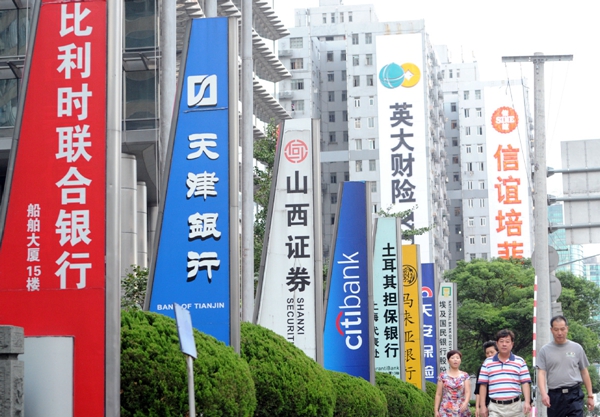Pudong further confirms status as China's major financial hub

Pedestrians walk by a line of financial institution signs in Lujiazui, a central business district of Pudong New Area, Shanghai. [Photo by Sha Lang/for China Daily]
Pudong New Area, a driving engine of Shanghai's economic development, was home to around 2,180 financial institutions by the end of last year, a further sign that the special district has cemented its label as China's major financial hub.
In 2018, the added value of the financial industry in the district recorded 293.71 billion yuan ($43.77 billion), official statistic says.
Last March, China launched its first crude oil futures contract at the Shanghai International Energy Exchange in the city's free trade zone in Pudong, the first futures contract listed on China's mainland with overseas investors. Later in the year, in August, an international reinsurance business platform of Shanghai Insurance Exchange was launched.
Featuring stocks, bonds, currencies, foreign exchange, insurance, commodity futures and financial futures, Pudong has now become one of the most concentrated locations for financial markets and the most active for trading activities.
In 2018, Pudong introduced 41 new licensed institutions in bank, insurance and security sectors, bringing the total number to 1,042 by the end of last year.
Apart from its role as a critical financial hub, Pudong is committed to creating a legal, international and convenient business environment for financial companies, with the country's first financial arbitral institution and financial court having been established in Pudong.
In 2018, Pudong rolled out five major measures in introducing high-caliber international financial talents, including building platforms conducive for talent development, advancing talent exchanges between home and abroad, and optimizing local legal environments.
The area also gave a boost to technological innovation. By the end of last year, Pudong had housed 105 domestic listed companies, 50 overseas listed companies and 184 listed companies in the stock exchange centers, a large amount of which are technology enterprises.
Looking to the future, the new area will continue to advance the financial economy and enhance efficiency in global financial resources allocation, with a focus on further reform and opening up and high-quality development.
 Contact Us
Contact Us

 Pudong lights up city with spectacular shows and cultural marvels
Pudong lights up city with spectacular shows and cultural marvels Brilliant light show to illuminate Huangpu River
Brilliant light show to illuminate Huangpu River Maple leaves paint splendid scenery in Pudong
Maple leaves paint splendid scenery in Pudong Appreciate alluring lotus blossoms in Pudong's Century Park
Appreciate alluring lotus blossoms in Pudong's Century Park


